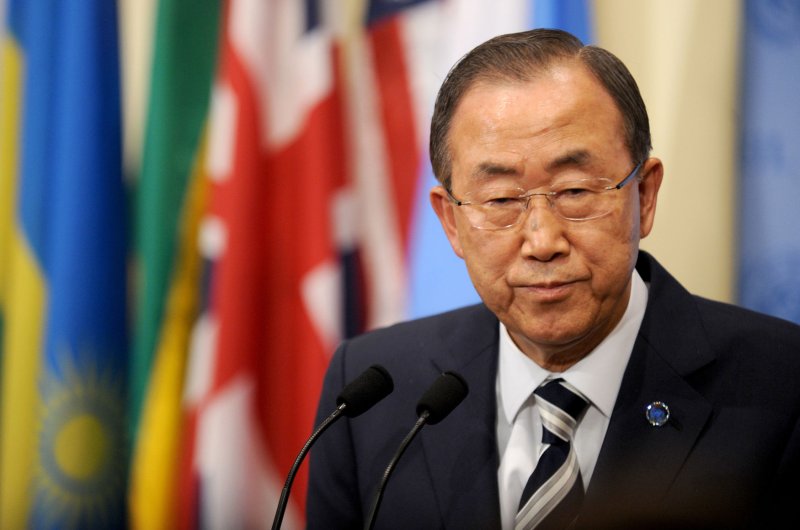1 of 6 | United Nations Secretary-General Ban Ki-moon speaks to reporters at United Nations Headquarters following a closed UN Security Council meeting discussing a just-released UN chemical weapons inspector's report about the use of sarin gas in Syria last month at the United Nations in New York City on September 16, 2013. UPI/Dennis Van Tine |
License Photo
NEW YORK, Sept. 17 (UPI) -- A U.N. resolution that's part of a Russia-U.S. plan for Syria to give up its chemical weapons was stalled by quarrels over what it includes, officials say.
At the center of the argument is whether the resolution should include provisions for military action if Syria fails to live up to its commitments, CNN reported Tuesday.
Russian Foreign Minister Sergei Lavrov, who developed the plan with U.S. Secretary of State John Kerry, said Tuesday he won't support a resolution that includes wording about a potential military strike.
However, the United States and France insist on the language as a way of forcing Syrian President Bashar Assad to comply.
Kerry and the British and French foreign ministers say they would accept no delays in dismantling Syria's chemical weapons.
"It is extremely important that there are no evasions," British Foreign Secretary William Hague said at a Paris news conference with Kerry and French Foreign Minister Laurent Fabius.
"If Assad fails in time to abide by the terms of this framework, make no mistake, we are all agreed -- and that includes Russia -- that there will be consequences," Kerry said.
"Should diplomacy fail, the military option is still on the table."
The agreement framework worked out Saturday by Kerry and Lavrov calls for all of Syria's chemical weapons to be eliminated by the middle of next year.
The chief diplomats of the three Western permanent U.N. Security Council members intend to press for a strong council resolution setting binding deadlines for removing Syria's chemical weapons, French President Francois Hollande's office said.
The U.S., British and French warnings came as U.N. inspectors said in a report released Monday they found "clear and convincing evidence" large quantities of the nerve gas sarin were used in an Aug. 21 attack on the suburbs of the Syrian capital Damascus.
That attack left hundreds of civilians gassed to death, including children.
The U.N. report didn't assign blame for the attack but detailed the large size and particular shapes of the munitions and the direction from which two of them were fired.
The United States and its Western allies cited the underlying evidence as proof of the Assad regime's responsibility. The rebel forces are not known to possess such weapons or the training or ability to use them, they said.
The report "confirms the position of those of us who have said the regime is guilty," Fabius said.
U.N. Secretary General Ban Ki-moon called the findings "beyond doubt and beyond the pale."
"This is a war crime and a grave violation of the 1925 [Geneva] Protocol [prohibiting the first use of chemical and biological weapons in international armed conflicts] and other rules of customary international law," Ban said.
"It is the most significant confirmed use of chemical weapons against civilians since Saddam Hussein used them in Halabja in 1988 -- and the worst use of weapons of mass destruction in the 21st century," Ban said.
"The international community has a responsibility to ensure that chemical weapons never re-emerge as an instrument of warfare," he said.
The Halabja chemical attack in northern Iraq's autonomous Kurdistan region during the closing days of the Iran-Iraq War killed a reported 3,200 to 5,000 Kurds and injured 7,000 to 10,000 more, most of them civilians.
Monday's U.N. report, commissioned by Ban, was the first independent scientific inquest into the Syrian attack.
Fabius told reporters the Syrian opposition would be invited to an international meeting in New York that would be convened on the margins of the U.N. General Assembly, which starts Tuesday but whose formal session with world leaders opens next week. The session is scheduled to continue through Oct. 4.
The U.S.-Russian framework must now be incorporated into a Security Council resolution.
Kerry and Western allies have said the resolution will be incorporated under Chapter VII of the U.N. Charter.
That chapter lets the council "determine the existence of any threat to the peace, breach of the peace or act of aggression" and take military action to "restore international peace and security."
Kerry has repeatedly said the Obama administration is also prepared to launch a unilateral strike if Syria fails to meet its commitments.
But Lavrov accused Kerry "and his Western allies" of misunderstanding the deal, Russia's government-run ITAR-Tass news agency reported.
Lavrov said the deal does not say the U.N. resolution would be under Chapter VII. He said it says if there is non-compliance "or any use of chemical weapons by anyone in Syria, the U.N. Security Council should impose measures under Chapter VII of the U.N. Charter."
But it does not state the resolution being sought now would be under Chapter VII, Lavrov said.
He invited Kerry "to read the document" Moscow and Washington endorsed.
Russia holds Security Council veto power.















